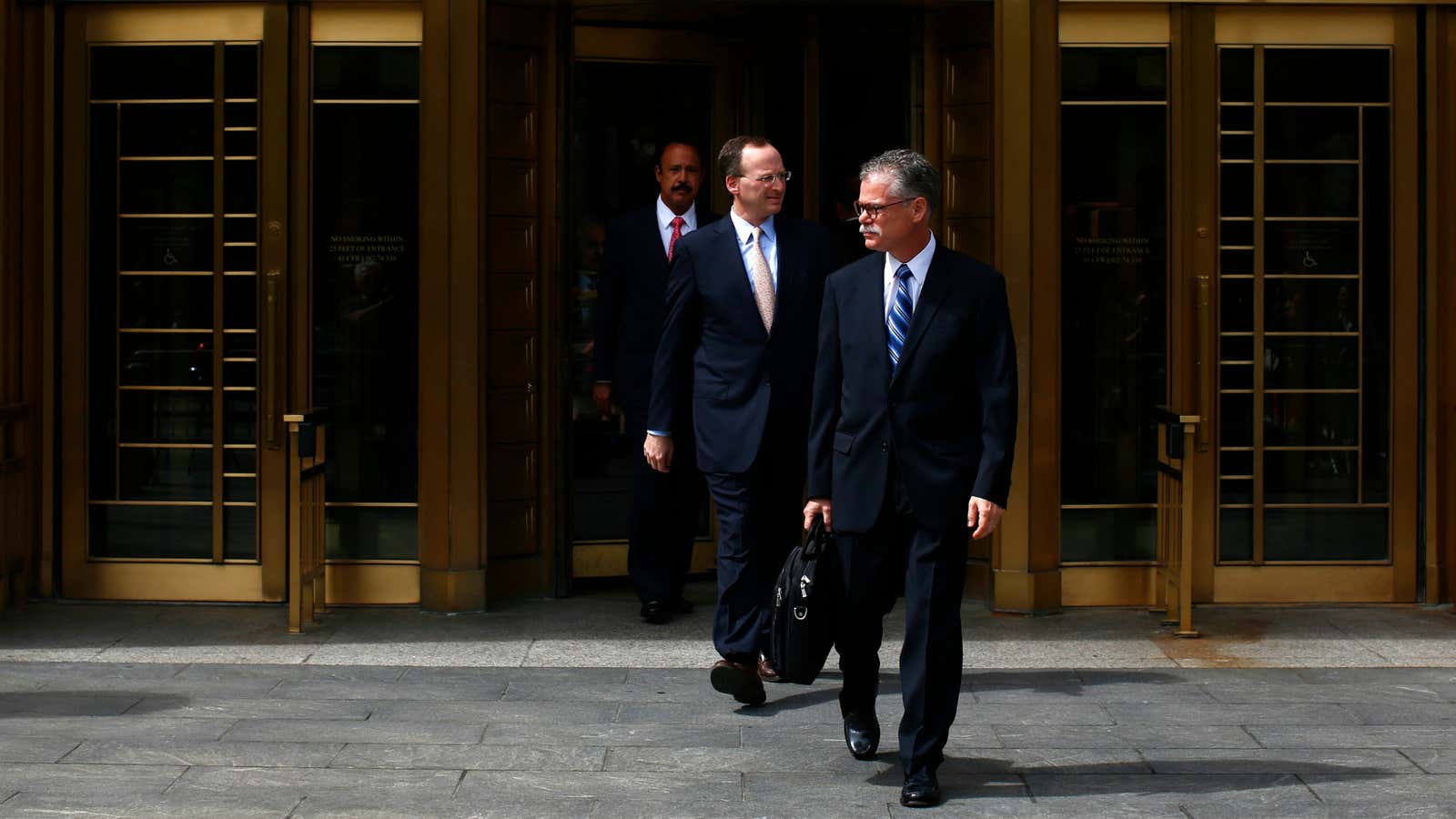The seemingly endless criminal investigation of SAC Capital appears to be winding down. The headline outcome: the firm pled guilty to insider trading and will pay $1.8 billion in tribute. Meanwhile, founder Steven A. Cohen fortuitously seems to be avoiding prosecution and preserving a $9 billion bankroll. To many people, that’s odd logic by the US Department of Justice: Can a non-criminal run a criminal organization?
If press leaks are to be believed, Cohen has escaped indictment—so far—least in part because fund managers Michael Steinberg and Matthew Martoma resisted prosecutors’ widely reported efforts to turn them into cooperating witnesses against him. The standard coercion tactic involves a discussion about decades in prison if tried and convicted versus significantly less time, often none, if one pleads guilty and then testifies against another target. As a result of their refusals, Steinberg finds himself on trial in federal court in lower Manhattan. Martoma will get his turn in the same venue on Jan. 6.
Will their trials be fair? I have my doubts.
I’ve sat where Steinberg is and Martoma is about to, in an awful environment for a businessman to be on trial. I was there in April 2009, in the midst of Bernie Madoff hysteria and the backwash of the worst economic downturn since the Great Depression, in front of a liberal judge, Jed S. Rakoff, and a hastily selected jury of two teachers, three office support personnel, a freelance magazine editor, a dance instructor, a retired purchasing manager, a recreational therapist, a Riker’s Island prison guard, and two people who were unemployed. I was convicted of charges related to non-cash, stock option accounting. (I continue to strongly maintain my innocence.)
It was a tough time. I lived the classic American Dream: blue-collar kid turned white-collar success, son of an ironworker and homemaker turned president and COO of an S&P 500 company. Before my trial, I had a patriotic confidence in the justice system. That evaporated quickly in the courtroom:
- My more than hard-earned wealth on trial was played aloud frequently for the low-income jury. That being the world I rose from, I empathized with their daily struggles but was concerned with the way the prosecution was inviting them to punish my success.
- Former colleagues became coerced government cooperators who embellished, created, and omitted as needed. One contacted me after my release from prison to apologize.
- The judge denied access to potential exculpatory evidence on a technicality. It was disheartening.
Steinberg and Martoma have already been tried in the press through countless SAC stories, leaked by anonymous sources that the government somehow shows no desire to unmask. That poisons the jury pool. And the reality is that once on the panel, jurors can look up those stories, refreshing their bias–and the judge is in effect powerless to stop them.
If that is not troubling enough, the jury pool will come from a left-leaning populace that overwhelmingly elected a socialist to be New York City’s next mayor. You can bet your bottom dollar that the prosecution will make both men’s wealth a big part of their trials.
Steinberg’s attorneys, so troubled about the jury pool state-of-mind, filed a sealed motion, with judge Richard Sullivan, requesting a trial delay to allow sufficient time for the current media storm to pass. Just prior to the trial, Sullivan summarily and publicly dismissed the request, generating additional headlines.
Why the concern? Throughout both trials prosecutors will likely paint Steinberg and Martoma as what president Barack Obama calls Wall Street’s “fat-cat bankers.” There does not appear to be any of the infamous 1% on Steinberg’s jury, which does include an unemployed home health care aide, a massage therapist, and a former postal service worker.
As Steinberg and Martoma sit in the hot seat, worried for their families and trying hard to stay calm, the prosecutors rotate former colleagues through the witness box. These men and women are the cooperators.
The cooperators will have met with the government numerous times to “go over” their testimony. They will be motivated to say what the government wants so they avoid jail time. Will the jury believe them? Will the jury even consider the pressure these witnesses are under to say what the government wants?
The accused SAC executives have to hope for the protection of a fair judge. Will they get it?
Consider what we can learn from the remarks of judge Jed S. Rakoff in a press earlier this year: Prosecutors “could not achieve the marvelous successes they’ve had in sophisticated crimes, like insider trading, without asking judges to give a very substantial benefit to cooperators.”
That raises two questions. First, cooperators have more incentive to say what the government wants than to tell the truth as they see it. If a man is testifying against a colleague only because the government has coerced him into it, can we trust him to be honorable enough to tell the truth? For example, the key witness against Steinberg is Jon Horvath. He has pled guilty to insider trading, testified that “he’s hoping to avoid jail time,” and admitted to once stealing prescription drugs and not being wholly truthful with US immigration officials in obtaining his green card.
Second, one wonders if Rakoff would consider an acquittal a “marvelous success.” This is the same judge who just two weeks ago, before the New York Bar Association, asked a question on the mind of many: “Why have no high level executives been prosecuted in connection with the financial crisis?” Good question, but is it one for a supposed independent arbiter of justice to be posing? If judges see their role as cheerleaders for indictments and the prosecutors’ paymasters to cooperators, can they be trusted to guarantee defendants a fair trial?
I have no idea whether Steinberg and Martoma are innocent but either way they deserve fair trials. I wish I were as confident as I once was that defendants like us could get them.
